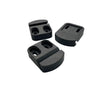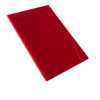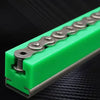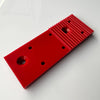The Versatility of Nylon Blocks: Applications in Gear Manufacturing and Mechanical Transmission

Why Are Nylon Blocks Important for Manufacturing?
Nylon blocks are important in many industries because they are strong, versatile, and cost-effective. They are used a lot in gear manufacturing and mechanical transmission because they have unique qualities that make them perfect for engineers and manufacturers. Nylon blocks are lightweight but tough, making them a great choice for many different uses. In this article, we will look at why nylon blocks are so popular and what makes them useful in different industries.
Nylon is a great material because it is strong, flexible, and resistant to chemicals. It works well in lots of engineering projects because of its durability and adaptability. This article will explain the benefits of nylon blocks and how they can be used to make machines work better and more reliably. We will also explore how custom machining can make nylon blocks even more useful for specific projects.
🎉🎉🎉Limited Time Offer Use code: QR4GNY08SHVR at checkout and enjoy a special discount on your entire order! 👉 Nylon plastic

What Are Nylon Blocks and How Are They Used?
Nylon blocks are solid pieces of plastic used in many industries because they are strong and durable. Nylon is a type of synthetic material known for its toughness and resistance to wear, which makes it a good alternative to metal parts, especially when you need something lighter or resistant to rust. Nylon blocks can be shaped into many different forms, making them very versatile.
Nylon's chemical structure gives it special qualities that are helpful in many manufacturing situations. Nylon's repeating chemical bonds make it resistant to repeated stress, which means it can handle heavy use without breaking down. This is especially important in machines that deal with a lot of repetitive motion. Nylon also resists oils, solvents, and moderate heat, which helps it stay strong in tough environments.
There are a few types of nylon commonly used in industries:
-
Nylon 6: This type of nylon is known for being tough and versatile. It handles impact well and is easy to work with, which makes it great for many different uses.
-
Cast Nylon: Cast Nylon is more stable and can be used for larger, high-strength parts. It is especially good when thicker parts with less internal stress are needed.
-
Nylon 66: This nylon has a high melting point and is very resistant to abrasion. It is great for high-performance parts that need to handle heat and heavy use.
Benefits of Nylon Blocks in Industry
Nylon Blocks Are Strong and Long-Lasting
Nylon blocks are very durable and can handle a lot of impact, which makes them great for tough industrial environments. Unlike metal, nylon can absorb shock without breaking, which makes machines safer and reduces the risk of failure. This shock-absorbing quality is very useful in situations where sudden impacts are common. Nylon's strength also means it can handle a lot of stress, making it dependable in tough situations.
Nylon's durability also comes from its resistance to wear. Parts made from nylon last longer and need less frequent replacements, which helps keep maintenance costs down. Because nylon can handle repeated stress and resist breaking, it is a reliable choice for machines that need to keep running without stopping.

Nylon Blocks Are Lightweight and Cost-Effective
Nylon blocks are much lighter than metal parts, which helps save energy and makes them easier to handle during assembly. Their light weight makes installation and handling easier, especially for jobs that require people to lift and move parts. Nylon is also cheaper to produce, especially in large quantities, where lighter parts can lead to lower transportation and operational costs.
Nylon is not only cheaper because of its material but also because it is easy to shape and machine. Manufacturers can create complex shapes out of nylon without spending a lot of money, which is very useful for custom parts. This makes nylon a great choice for companies that want to keep costs low while still producing high-quality components.
Custom Nylon Machining for Special Projects
Custom Nylon Machining allows manufacturers to create nylon blocks that meet specific needs. Whether used for gears, bushings, or other parts, custom machining helps make sure that nylon blocks meet exact requirements, showing how adaptable they are for many different uses.
Custom machining also allows for special design features, like grooves or slots, that may be needed for specific applications. Nylon can be shaped into complex forms that fit perfectly into mechanical systems, offering customized solutions for different projects.
Nylon Blocks in Gear Manufacturing
Nylon Gears: A Quieter, Longer-Lasting Choice
Nylon blocks are often used to make gears because they are quieter and wear out more slowly compared to metal gears. Nylon gears are self-lubricating, which means they need less maintenance and last longer. Nylon also absorbs vibrations, which helps gears run more quietly and efficiently.
Nylon's self-lubricating properties also mean there is less friction, which improves efficiency and saves energy. This is very helpful in machines where smooth operation and quiet performance are important, like in robots or automated systems. Less friction also means that nylon gears do not overheat, which makes them last even longer.
Industries That Benefit from Nylon Gears
Many industries, like automotive, robotics, and farming, use Nylon Gears. In cars, nylon gears help make powertrain systems quieter and lighter, which improves performance and comfort. In robotics, nylon gears help robots move smoothly and accurately. In farming equipment, nylon gears are great for tough environments because they resist moisture and chemicals.

Nylon Blocks in Mechanical Transmission Parts
How Nylon Blocks Improve Mechanical Transmission
Nylon blocks are very useful in Mechanical Transmission Parts because they make machines more efficient and last longer. Nylon is tough and resistant to abrasion, which makes it a good choice for bushings, bearings, and other key parts in transmission systems. These properties help nylon parts handle the high loads and friction in power transmission, making them reliable for industrial machines.
Nylon also helps reduce vibration and noise in mechanical systems, which keeps machines stable and running smoothly. By cutting down on vibration, nylon parts help prevent wear on other components, which means the whole system lasts longer. This is especially important in machines that need precision, like CNC tools and automated production lines.
Real-Life Examples of Nylon in Machines
Nylon blocks are used in bushings to reduce friction between parts, and in bearings that need to be resistant to wear. These uses are common in industries like automotive and heavy machinery, where reliability is very important. For example, in car suspension systems, nylon bushings help reduce noise and absorb shock, improving the ride quality.
In heavy machinery, nylon bearings help support moving parts by reducing friction and preventing overheating. Nylon's ability to handle different loads and temperatures makes it perfect for heavy-duty applications where performance must be consistent. These real-life examples show how effective and versatile nylon is in mechanical systems.
CNC Machined Nylon Components for Precision
Precision Machining of Nylon Components
CNC Machined Nylon Components offer the precision and flexibility needed for specialized projects. CNC machining allows manufacturers to create complex shapes with tight tolerances, which is very important for making gears and other parts that need to be exact. The ability to make detailed and consistent shapes with CNC machining makes nylon a good choice for parts that need special designs.
CNC machining is also useful for creating prototypes and small batches, which helps when custom parts are needed. This flexibility allows engineers to test designs before full production, reducing the risk of errors and making sure the final parts meet all the requirements. CNC machining helps ensure nylon components fit perfectly in their intended systems, making everything work better and more reliably.
Benefits of CNC Machining Nylon
CNC machining makes sure that each nylon part is made to exact standards, which is very important for gears and transmission parts that need to work well together. This consistency means that nylon parts are reliable and efficient.
CNC machining also improves nylon's quality by reducing internal stress that can happen with regular machining. This precision helps prevent defects like warping or surface problems, leading to parts that perform well and last a long time. High-quality control is important for industries like aerospace and medical devices, where even a small failure can have big consequences.

Cast Nylon vs. Nylon 6: Which Is Better?
Comparing Cast Nylon and Nylon 6
Cast Nylon and Nylon 6 are two popular types of nylon, each with their own strengths. Cast Nylon is usually used for large, tough parts because it is very stable and strong. It is great for parts that need to handle heavy wear and stress. The casting process allows thicker sections to be made with less internal stress, which is important for parts that need to stay stable.
Nylon 6, on the other hand, is very versatile and handles impact well, which makes it good for many different uses. It is easier to mold and machine than Nylon 66, which makes it more flexible for different projects. Nylon 6 is often used for parts that need to handle impacts and absorb shocks.
Choosing Between Cast Nylon and Nylon 6
The choice between Cast Nylon and Nylon 6 depends on what you need for your project. Cast Nylon is best for parts that need to be very strong and wear-resistant, especially if they are large. Nylon 6 is better for parts that need flexibility and impact resistance. Things like load requirements, environmental conditions, and the complexity of the part should all be considered when choosing the material.
If you need large, stable parts that can handle a lot of stress, Cast Nylon is the way to go. If you need parts that are strong but also flexible, Nylon 6 is a better choice. Knowing the differences helps engineers make the best decision for performance and cost.
Using Nylon Blocks in Industry
Nylon blocks are strong, versatile, and cost-effective solutions for many industrial uses, especially in gear manufacturing and mechanical transmission. With options like Cast Nylon, Nylon 6, and the ability to be custom-machined, nylon blocks offer a great combination of strength, light weight, and flexibility. Their unique properties, along with the precision offered by CNC machining, make nylon blocks a top choice for engineers looking for reliable solutions.
Whether used for gears, bushings, bearings, or custom components, nylon blocks continue to prove their value in many industries. By understanding the benefits of different types of nylon and using modern machining techniques, manufacturers can get the most out of nylon blocks to improve their products.
If you want to learn more about custom nylon solutions for your projects, feel free to reach out to us. Our team is ready to help you with Nylon Blocks or CNC Machined Nylon Components tailored to your needs.
🎉🎉🎉Limited Time Offer Use code: QR4GNY08SHVR at checkout and enjoy a special discount on your entire order! 👉 Nylon plastic

FAQs
-
What are the advantages of nylon gears over metal gears? Nylon gears are significantly lighter, quieter, and require less maintenance compared to metal gears. They also possess self-lubricating properties, which help to reduce friction and extend their operational lifespan. Furthermore, nylon gears are more resistant to corrosion, making them suitable for use in environments where metal gears might degrade over time.
-
How does custom machining enhance the performance of nylon blocks? Custom machining enables nylon blocks to be precisely tailored to meet the application’s specifications, ensuring a perfect fit and optimizing overall performance. By allowing for intricate designs and tight tolerances, custom machining enhances the functionality and reliability of nylon components, especially in specialized applications.
-
What industries benefit most from using nylon blocks in mechanical transmission? Sectors such as automotive, robotics, and heavy machinery greatly benefit from nylon blocks due to their durability, noise-reducing qualities, and high resistance to wear. Additionally, industries like aerospace and medical devices also leverage nylon's properties for components that require lightweight materials with excellent mechanical performance.
-
Posted in
Cast Nylon, CNC Machined Components, custom machining, Gear Manufacturing, industrial applications, mechanical transmission, Nylon 6, nylon blocks, nylon gears








